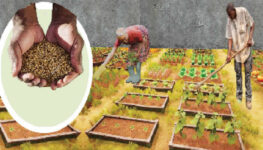
Six tips on how to own a thriving home garden
The cost of buying fresh fruits and vegetables from the market has skyrocketed, prompting many to consider owning a home garden. However, space is often a significant concern as most city dwellers live in rented apartments.
According to a recent report by an online real estate platform, BuyLetLive, approximately 98.5 per cent of Lagos residents reside in rented accommodations.
Living in rented apartments makes it seemingly difficult to own a home garden because there is barely enough ground space for all residents to park their vehicles, let alone have space for a garden.
That’s where small balconies come in. Owning a home garden in cities doesn’t have to be an elaborate and grand affair; even small spaces like balconies can be utilised for growing plants bonsai-style.
Not only does this provide a ready supply of home-grown fresh vegetables, but it also keeps the mind engaged and active.
Cultivating a home garden on your balcony involves just the space, tiny pots, and seeds.
Wisdom and science play crucial roles in the art of home gardening. Without them, you may end up wasting your time and money, which nobody wants in this economy.
So, here’s some advice from a home gardening expert on how to successfully own a home garden.
Good Quality Seeds
To own a thriving and lush garden, you must use the right seeds, says Uduak Bassey, a home gardener with years of experience growing fruits and vegetables.
Speaking on the choice of seeds, she said, “Choosing the right plants and high-quality seeds is crucial for a thriving garden, as it ensures predictable results and allows you to save seeds for future use. This approach can save you time and money in the long run.
For example, growing strawberries in Lagos may not be successful due to incompatible growing conditions, so opting for native plants that suit your local environment will yield better results.”
Bassey also discourages using seeds from market-bought produce because the quality of their fruits may be sub-par.
Soil Quality
From her experience and extensive research, Bassey advises, “Ensure your soil is rich in nutrients, well-drained, and has the right pH for your plants.
Use compost and organic matter to enhance soil health and fertility. Good quality soil will give you more robust plants.”
Sunlight
She also advises aspiring gardeners to choose a location that will ensure the plants receive adequate sunlight based on their needs, revealing that most vegetables and flowering plants require at least 6-8 hours of direct sunlight daily.
Watering
Just as plants need sunlight, they also need water. It’s important to water the garden consistently, keeping the soil moist but not waterlogged. Adjust the watering frequency based on weather conditions and the specific needs of your plants.
Pest Management
“I’m sure you’ve heard the phrase, ‘prevention is better than cure’. It applies to gardening too! Monitor your garden regularly for pests and diseases. Catch the pests early, before they multiply rapidly and spread. Use integrated pest management techniques, including beneficial insects, natural predators, and bio-pesticides to keep pests under control,” she advises.
Mulching
This is the process of covering the topsoil with plant material such as leaves, grass, twigs, crop residues, straw, etc.
“Applying mulch around the plant helps to retain soil moisture, regulate temperature, and suppress weeds,” Bassey says.
She also notes that organic mulches like wood chips, dry leaves, or straws improve soil fertility as they decompose.



